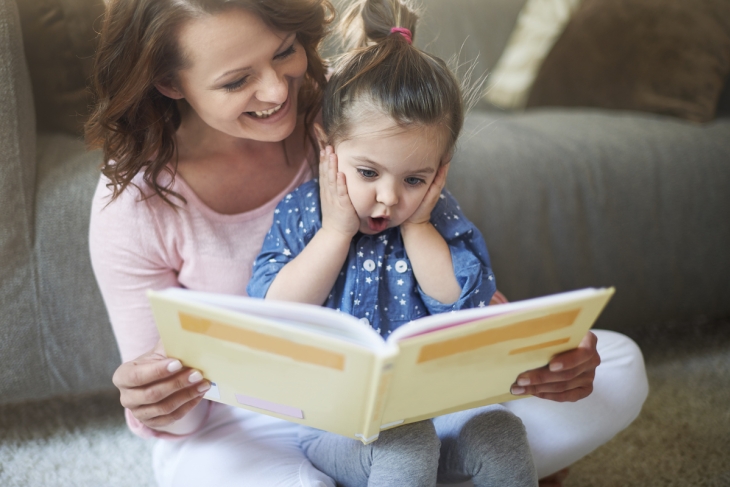Research is resoundingly clear that regularly reading to and with our children leads to all sorts of positive outcomes. It boosts children’s brain development, expands their vocabularies, strengthens their listening skills, fosters creativity and imagination, and deepens the emotional bonds between children and their caregivers.
For gifted preschoolers and kindergarteners, reading with their parents or other caregivers can be especially beneficial. As Dr. James T. Webb writes in one of my favorite books about parenting gifted children, “As a group, they [gifted children] hit developmental milestones earlier—sometimes much earlier—and more intensely than other children, they process more abstract ideas at an earlier age than other children, and they react to stimuli with more sensitivity.”
As a result, parenting gifted children is equal parts a gift, a challenge, and a huge responsibility. They tend to have strong verbal abilities, intense curiosity, a wide range of interests, uncanny memories, and a strong desire to learn. But they often tend to view the world somewhat differently than their peers, and can be highly sensitive, intense, and (at least in our household) prone to over-excitability.
As with getting physical activity, reading or listening to stories is particularly powerful for gifted children because it gives them a break from their busy, inquisitive, and intense brains. Books also allow parents to expand on what their kids are learning in school and nurture their interests and passions, and they help gifted children make sense of themselves and the world around them.
At least once a week, I take my two young children to our local library and allow them to pick out whichever books pique their interest. While my three-year-old usually bolts for the Disney princess section, my five-year-old inevitably brings home a stack of informational texts with titles ranging from Animals of East Asia to Transportation Technology (mixed in with the occasional book about Legos). Their actual book choices don’t matter nearly as much to me as fostering in them a deep and lasting love of reading. All reading is good reading.
During our weekly library runs, I also try to grab a book or two that I hope will help further their social and emotional development. Yes, books are part of SEL, too, as well as a wonderful way to explore and foster children’s innate curiosity for facts, data, and knowledge. It can also be powerful and reassuring when kids see themselves in precocious literary characters.
So if you haven’t yet, let this be a plea to make reading a regular part of your routine with your gifted child or children. Read with them books about their favorite subjects or that feature children like them. Expose them to a wide range of engaging, challenging reading material. And make sure to ask lots of open-ended questions as you read together. What do you think happens next? How do you think the main character is feeling? Why did you choose this book?
Below are some of our favorite books—with plenty of pictures—that may also be hits with your gifted preschoolers or early elementary students. Happy reading!
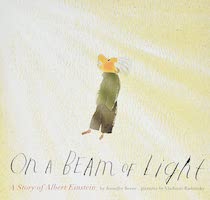
If your child is curious, fixated on numbers, or asks endless questions about why things are and how things work, he or she will love this heartwarming story about Albert Einstein as a child. It reinforces for gifted children that it’s OK to be different from other students and that it’s a positive thing to keep reading, wondering, and learning.
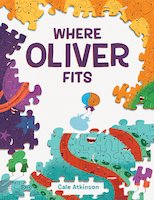
Some gifted children experience challenges relating to their peers and siblings, as their development is so out of sync with their age. But even our extroverted children love this story, which focuses on how hard it can be to try to fit in, and why it’s best to always be yourself. This book is also fairly easy for early readers to read out loud or by themselves.
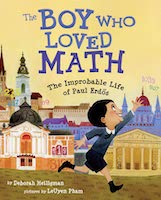
Here’s a great one for gifted children who are really into math and numbers, but who, like the main character, may have trouble following rules or sitting still. Like Where Oliver Fits, it touches on the importance of being yourself and finding friends with similar interests.
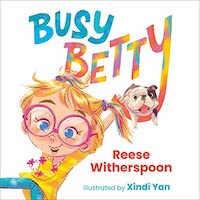
Busy, spirited kids will also surely relate to the main character, Betty, in this new book by actress Reese Witherspoon. As the author recently explained, “Betty’s curiosity, enthusiasm, and sense of adventure teaches kids that anything is possible—especially with great friends.”
You’re Always Enough: And More Than I Hoped for
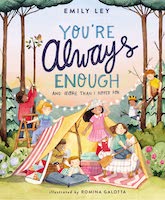
For gifted children, increased sensitivity is often accompanied by perfectionism and a fear of making mistakes. This book by Emily Ley helps reassure children that they are enough just as they are, and that perfection is overrated. As the Cub Scouts say, just “do your best.” (Note: This book includes Christian messaging. A good secular book about the pitfalls of perfectionism is The Girl who Never Made Mistakes.)
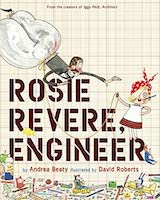
In catchy rhyme, this book tells the story of a girl who dreams of being an engineer. While initially held back by fear of failure, throughout the story she learns from her mistakes and proudly begins to pursue her dream. One of the most powerful lines for kids in the book is that “The only true failure comes if you quit.”
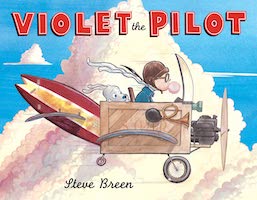
This is another great book that reassures gifted kids that it’s a good thing to be different. It tells the story of a girl who loves to invent and tinker, who isn’t well understood by her peers, but who, thanks to her unique talents, ends up a hero.
National Geographic Kids books
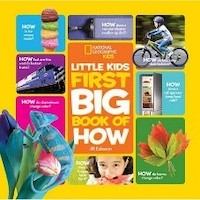
These books are a slam dunk for kids who soak up facts like a sponge. There are tons of choices, with topics ranging from space to famous places, historical figures, and more. (Our son’s latest favorites are Little Kids First Big Book of the World and the Weird but True! Series.) Nature lovers will also enjoy the Nat Geo Kids (and Little Kids) magazines, which are a perennial hit in our household.
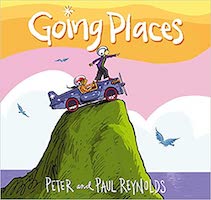
According to the National Association for Gifted Children (NAGC), gifted children are often unusually creative and out-of-the-box thinkers. This quick read about a go-kart-building competition underscores the importance of creative thinking and working together with friends. (Another good read about creativity, frustration, and perseverance is The Most Magnificent Thing.)
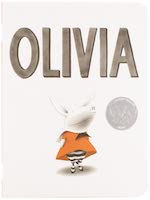
Olivia is a short but sweet story about a headstrong little pig who is “good at lots of things,” including wearing herself and others out, and resisting naps and bedtime. (Sound familiar?) The underlying messages for precocious toddlers and preschoolers are pretty powerful: It’s important to have self-confidence, and your parents or guardians will always love you no matter how challenging or exhausting your behavior and antics. Olivia exhibits self-confidence and a sense of purpose, both traits common in gifted children.
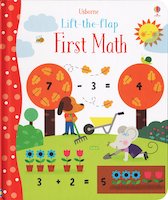
This is a great book for budding mathematicians. It introduces simple math concepts such as counting, addition, and subtraction in a colorful, interactive “lift-the-flap” format. (Another fun, slightly more advanced math workbook for number-minded preschoolers and kindergarteners is The Complete Kindergarten Math Workbook.)
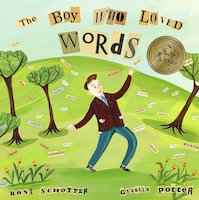
Children with unusually large vocabularies for their age will likely relate to the boy in this story who is occasionally exhausted by his expansive vocabulary and very active brain. The main character eventually realizes that his love of words is a gift, and should be shared with others. The rich and lyrical vocabulary used throughout is an extra treat for adults and kids alike.
Up in the Garden and Down in the Dirt
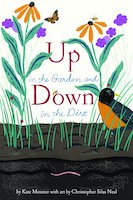
According to NAGC, “Being outdoors in nature can offer [gifted children] a break from anxiety, providing a quiet space in which to relax and calm down.” There are many wonderful books about nature, but Up in the Garden and Down in the Dirt is beautifully illustrated, and covers everything from gardening and growing to the changing seasons. Other fantastic nature-themed books that my kids enjoy are There’s a Tiger in the Garden, A Walk in the Forest, and Tiny, Perfect Things.
Your Fantastic Elastic Brain: Stretch It, Shape It
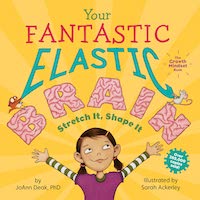
Gifted children are often rapid learners with an impressive capacity for retaining information. But all children interested in science or anatomy will enjoy this engaging and informative book about how the brain works, how we learn, and how our brains grow. The companion book, Goodnight to Your Fantastic Elastic Brain, is equally wonderful.
